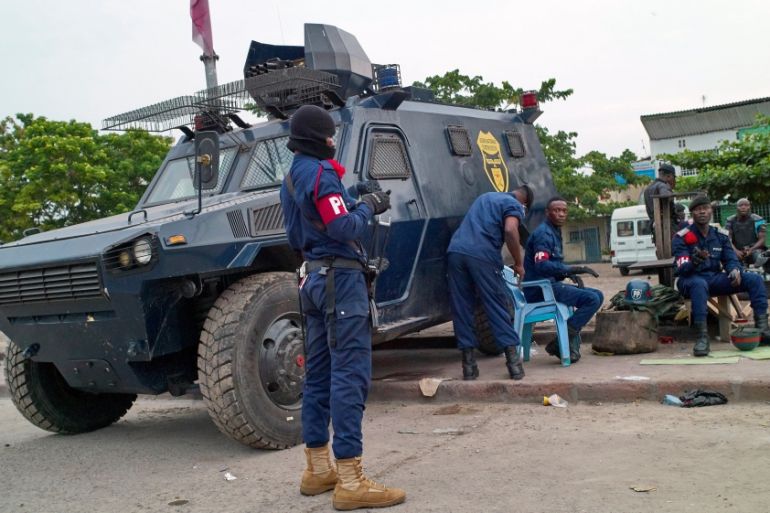More than two dozen people killed in DRC protests
Fears grow after Human Rights Watch reports at least 26 people killed in demonstrations as Joseph Kabila refuses to go.

Security forces in Democratic Republic of Congo killed at least 26 demonstrators and arrested scores more amid growing protests against Joseph Kabila’s hold on power, according to a human rights group.
|
|
Despite the bloodshed overnight, the situation was calm early on Wednesday.
Keep reading
list of 4 itemsIn protests-hit DRC, a fierce power struggle deepens
DRC PM lashes out at ‘arbitrary’ detention of justice minister
‘Father of democracy’: DRC’s Etienne Tshisekedi laid to rest
The killings on Tuesday were the first reported since Kabila’s mandate to rule ended on Monday at midnight after 15 years as president. He has refused to cede power until new elections are held, which may not happen until 2018.
Protesters set fire to the headquarters of the ruling party in the capital, Kinshasa.
Military and police forces fired live rounds, raising fears more people may have been killed, New York-based Human Rights Watch said.
Its researcher, Ida Sawyer, said on Twitter the killings took place in Kinshasa, the southern city of Lubumbashi, and elsewhere.
Residents also told the group Republican Guards were carrying out door-to-door searches and arresting young people. Authorities have also blocked most social media.
Political talks between the ruling party and opposition, which stalled over the weekend, were expected to resume on Wednesday with mediators from the Catholic church.
‘End of the match’
Kabila, who took office in 2001 after his father’s assassination, is constitutionally barred from seeking another term, but a court has ruled he can remain in power until new elections, which have been delayed indefinitely. The poll was meant to be held in November, but the ruling party said it needs more time – until 2018, at least.
The leader of Congo’s largest opposition party, Etienne Tshisekedi, urged peaceful resistance to what he called Kabila’s “coup d’etat”.
In a statement posted on YouTube on Tuesday, he called the president’s actions “treason” and appealed to the Congolese people and the international community to no longer recognise Kabila’s authority.
The political impasse has fuelled fears of widespread unrest in the central African nation, which has vast natural resources but remains one of the world’s poorest and most unstable countries.
READ MORE: Congolese IDPs in North Kivu face Bulengo camp closure
Negotiations have stalled over a date for new elections and the release of political prisoners.
Both are key demands of the opposition parties, along with the dropping of criminal charges against opposition leader Moise Katumbi, who fled the country as authorities announced plans to prosecute him for allegedly hiring mercenaries.
Katumbi’s supporters say the charges are politically motivated.
Dozens of people were killed in September when the opposition took to the streets after the electoral commission failed to schedule the presidential election.
Western powers are nervous about a repeat of the conflicts between 1996 and 2003 that killed millions, drew in half a dozen neighbouring armies, and saw rebel fighters rape women en masse.
Congo has not experienced a peaceful transition of power since independence from Belgium in 1960.
|
|